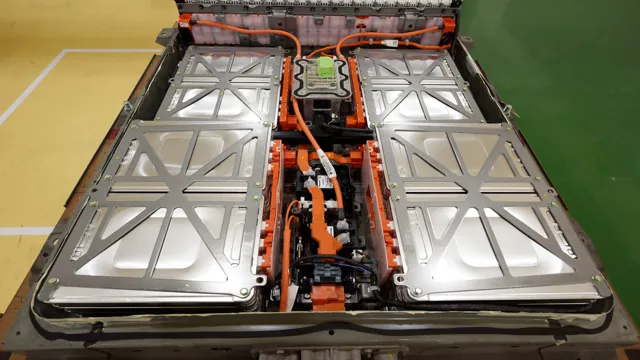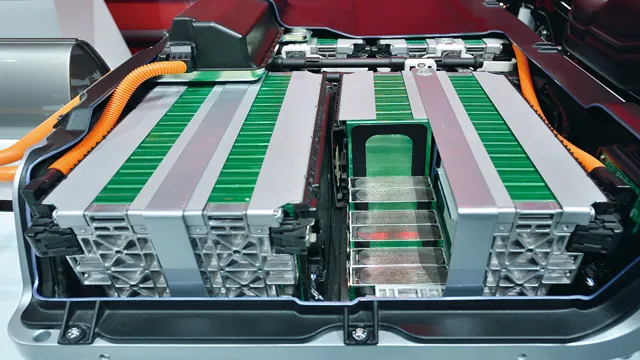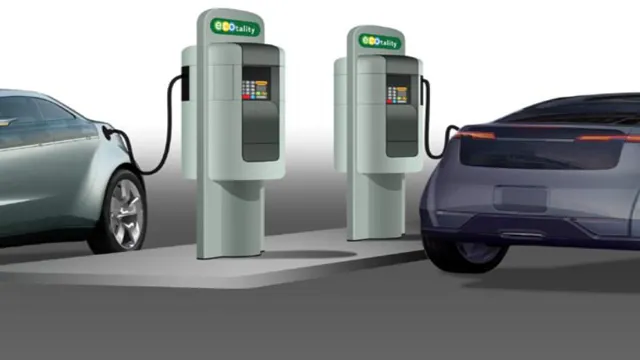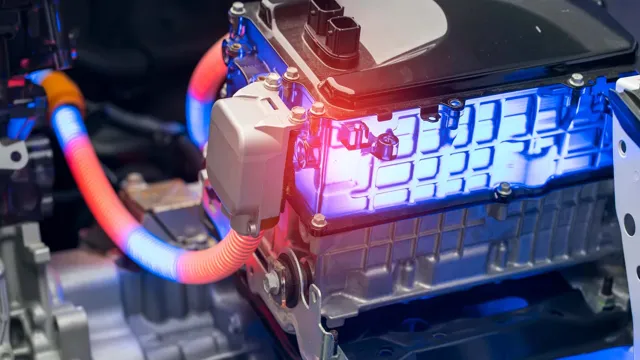Revolutionizing the Automotive Industry: Latest News on Electric Car Batteries
Electric cars are becoming more and more popular as they are a greener alternative to traditional gasoline-powered vehicles. However, a common concern for electric car owners is the longevity of the battery and how far it can take them. That’s why it’s important to stay up-to-date with the latest battery news for electric cars.
The world of electric cars is constantly evolving, and new advancements in battery technology are being made all the time. Whether it’s longer-lasting batteries, faster charging times, or more energy-efficient models, there’s always something new to learn about these cutting-edge vehicles. One recent development in battery technology is the use of solid-state batteries, which could potentially replace the lithium-ion batteries currently used in electric cars.
These batteries offer higher energy density, faster charging times, and increased safety. Another exciting advancement is the integration of solar panels into the body of electric cars, which could potentially extend their range even further. With these solar panels, the car can generate energy while it’s parked or even while it’s driving, reducing the dependence on traditional charging methods.
It’s clear that the world of electric cars and battery technology is constantly evolving, and staying informed about the latest developments is crucial for both current and potential electric car owners. By staying up-to-date with the latest battery news, you can make informed decisions about your car’s battery health and future upgrades.
Advancements in Technology
Have you heard the latest news on electric car batteries? Top car manufacturers are making great strides in developing innovative battery technologies which promise to revolutionize the electric car market. One such advancement is solid-state batteries, which are believed to offer higher specific energy density, faster charging times, and improved safety compared to current lithium-ion batteries. Toyota plans to introduce solid-state batteries in its electric cars by 202
Another company to watch is Tesla, which recently revealed its new 4680 cells that feature a larger cylinder design for greater energy capacity and improved cooling. With these advancements, we can expect electric cars to become even more efficient and practical, making them an increasingly popular choice for environmentally conscious consumers. It won’t be long before we see electric cars with energy capacity that can surpass that of traditional gasoline-powered cars, and provide better driving range as well.
It’s an exciting time to be in the automotive industry, where innovation meets sustainability, and the electric car market is leading the way.
New Research on Batteries’ Performance and Longevity
Advancements in technology have led to exciting new research on batteries, including the improvement of their performance and longevity. With the advancements in electric vehicles and electronic devices, the demand for better batteries has increased. As a result, researchers are working hard to develop new materials and designs that can help batteries last longer and become more efficient.
Some of the materials being investigated include lithium-sulfur, solid-state, and metal-air batteries. These new designs are expected to provide better energy storage capabilities, longer lifetimes, and faster charging times. The lithium-sulfur battery, for example, has the potential to store up to five times more energy than its lithium-ion counterpart.
This could revolutionize the battery industry and make it possible to power more electric vehicles and devices with fewer recharging interruptions. With these advancements in battery technology, the future looks bright for a world powered by clean and sustainable energy.

Innovations in Charging and Battery Management Systems
In the rapidly evolving technological landscape, one area that has seen significant advancements is charging and battery management systems. Today, with the prevailing use of mobile devices, smartphones, and laptops, consumers demand faster charging times and longer battery life. With this in mind, manufacturers have been working hard to find innovative solutions that meet these demands.
One of the most promising developments in this field is the rapid charging technology that can fully charge your device in minutes. This is achieved by pumping in more power without damaging the battery. To help manage power usage and extend battery life, newer devices come equipped with advanced battery management systems that monitor the battery’s health, adjust the device’s temperature, and optimize power consumption.
Applying these advancements in technology has certainly led to a better user experience, making our digital lives more convenient and efficient.
Industry Updates and Trends
The electric car industry has been expanding at a rapid pace, and one of the latest trends is in electric car batteries. As more and more automakers begin to develop electric vehicles, the demand for batteries that can provide longer ranges and quicker charging times has soared. Recent news has highlighted developments in solid-state batteries, which use a solid electrolyte instead of a liquid one, allowing for potentially safer and more efficient energy storage.
Tesla has also announced plans to produce its own batteries in-house, with the goal of reducing costs and improving performance. Additionally, efforts are underway to recycle and repurpose old batteries, as the sustainability of electric cars becomes increasingly important. These advancements and strategies indicate a bright future for electric car batteries, and the potential for further improvements and breakthroughs in the coming years.
Companies Launching New Electric Cars
Electric cars have been gaining popularity in recent times, and numerous companies have launched new models to cater to this market demand. With the need for sustainable and eco-friendly alternatives to traditional gasoline-powered vehicles, leading automobile manufacturers have initiated the development of affordable electric cars. These companies include Tesla, Rivian, Lucid Motors, and Ford, amongst others.
The latest industry updates reveal significant trends for electric cars, ranging from extended battery life, faster charging times, improved range, and advanced features such as autonomous driving. Some of the new electric cars to watch out for include the highly anticipated Tesla Cybertruck, the Lucid Air, and the Ford Mustang Mach-E. As companies continue to innovate and work towards reducing the environmental impact of transportation, electric cars are becoming more commonplace and necessary.
These electric cars offer many benefits, such as reduced carbon emissions, lower maintenance costs, and a smoother driving experience. It is no wonder that they have become a popular choice for environmentally conscious drivers, paving the way for a cleaner future.
Shift Toward Lithium-Ion Battery Production
The shift toward lithium-ion battery production in recent years is a significant development in the battery manufacturing industry. Lithium-ion batteries are gaining popularity due to their high energy density, low self-discharge rate, and longer lifespan compared to traditional lead-acid batteries. The increasing demand for electric vehicles and portable electronics is driving the growth of the lithium-ion battery market.
Big players in the industry are investing in lithium-ion battery technology to stay ahead of their competition. With lower production costs and improved manufacturing processes, lithium-ion batteries are becoming more accessible to consumers. As a consumer, investing in portable electronics or electric vehicles that use lithium-ion batteries may save you money in the long run and contribute to a more sustainable future.
Government Incentives for Electric Car Adoption
Electric car adoption is on the rise, and with it comes a wave of government incentives to encourage more people to switch to the eco-friendly mode of transportation. Many countries around the world, including the United States, the United Kingdom, and Canada, are offering various incentives to encourage consumers to buy electric cars. These incentives come in the form of tax credits and rebates, reduced registration fees, and even free charging infrastructure in some areas.
For instance, in the US, electric car buyers can get up to $7,500 in federal tax credits, while some states also offer additional incentives. Similarly, the UK government offers a grant of up to £2,500 to help electric car buyers with the cost of purchasing a new or used vehicle. These incentives are helping to make electric cars more affordable and accessible to a wider range of consumers.
As the world continues to move towards a greener future, government incentives are likely to play an even more significant role in promoting electric car adoption.
Environmental Impact of Electric Car Batteries
As electric cars become more popular, there has been a lot of buzz around the environmental impact of their batteries. While electric cars produce zero emissions on the road, their batteries are made up of materials that need to be mined and processed, which has an environmental impact. However, recent advancements in battery technology have led to more efficient and environmentally friendly ways to produce electric car batteries.
Some companies are using recycled materials, while others are developing new chemistries that reduce the need for mined materials. It’s important to continue to research and improve electric car battery technology to minimize the environmental impact and make them a sustainable transportation solution. Overall, electric car batteries have come a long way, and the latest news suggests that there is a bright future ahead for this technology.
Recycling and Reusing Batteries
Electric car batteries have a significant environmental impact. While they are great for reducing emissions and improving air quality, the production and disposal of electric car batteries can have negative consequences. The mining of materials used in batteries, such as lithium, can lead to water pollution and harm local ecosystems.
Additionally, the disposal of old batteries can lead to leaching of toxic chemicals into the environment. It is important to recycle and reuse batteries as much as possible to reduce the need for new materials and minimize the amount of waste produced. By doing so, we can protect the environment and create a more sustainable future.
Reducing Battery Waste in Manufacturing
When it comes to electric cars, the batteries used to power them have a significant impact on the environment. While these batteries are efficient and produce zero emissions while in use, their production and disposal pose environmental challenges. Manufacturing batteries requires mining for materials like lithium, cobalt, and nickel, which can contribute to environmental degradation and harm wildlife in surrounding areas.
Moreover, when batteries reach the end of their lifespan, they can release toxic substances that can pollute soil and waterways if not properly disposed of. To reduce the environmental impact of batteries used in electric cars, it’s crucial to minimize battery waste during the manufacturing process. This can involve recycling and reusing materials, minimizing the use of toxic substances, and focusing on sustainable sourcing practices to reduce the need for mining new materials.
By taking these steps, manufacturers can reduce the environmental impact of electric car batteries and contribute to a more sustainable future for the automotive industry.
Future Outlook for Electric Car Batteries
The latest news on electric car batteries is promising – with advances in technology, batteries are becoming more efficient, allowing for longer ranges and shorter charging times. Some experts predict that by 2030, electric cars will be cheaper to buy than gas cars, due in part to the declining cost of batteries. Additionally, research is being done to develop solid-state batteries, which would provide even more energy density and potentially eliminate the need for rare and expensive materials currently used in traditional lithium-ion batteries.
Tesla, among other car companies, is investing heavily in battery production, with plans to build giant factories to accelerate the transition to renewable energy. With these advancements, the future looks bright for electric cars and their batteries, paving the way for a more sustainable future.
Conclusion
As the latest news in electric car batteries continues to electrify the automotive world, it’s clear that the future of transportation is headed in an electric direction. With advancements in range, charging time, and cost efficiency, electric car batteries are now able to offer a viable alternative to traditional gasoline-powered vehicles. From Tesla’s cutting-edge technology to General Motors’ commitment to a zero-emissions future, there has never been a better time to be an eco-conscious driver.
So let’s charge ahead into a brighter, cleaner, and more sustainable tomorrow – where electric cars are the norm and gas stations become a distant memory. After all, why pay for gas when you can simply plug in and drive off into the sunset?”
FAQs
What are the latest advancements in electric car battery technology?
The latest advancements in electric car battery technology include solid-state batteries, which have the potential to offer higher energy density and faster charging times, and lithium-sulfur batteries, which could increase the range of electric vehicles.
How long do electric car batteries typically last?
The lifespan of electric car batteries can vary depending on factors such as the type of battery, usage patterns, and environmental conditions. However, most electric car batteries are designed to last for around 100,000 to 200,000 miles before they need to be replaced.
Are electric car batteries recyclable?
Yes, electric car batteries are recyclable. The process typically involves recovering materials such as lithium, cobalt, and nickel to be reused in the production of new batteries or other products.
How do cold temperatures affect electric car batteries?
Cold temperatures can decrease the efficiency of electric car batteries, leading to reduced range and performance. However, some electric vehicles now come equipped with battery heating systems to help mitigate the effects of cold temperatures.





